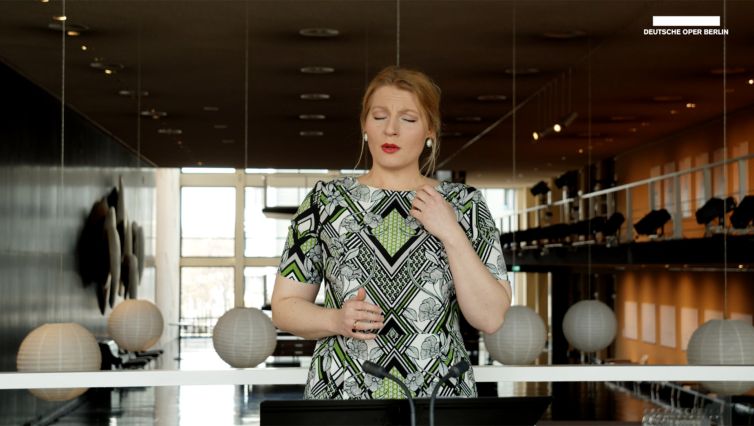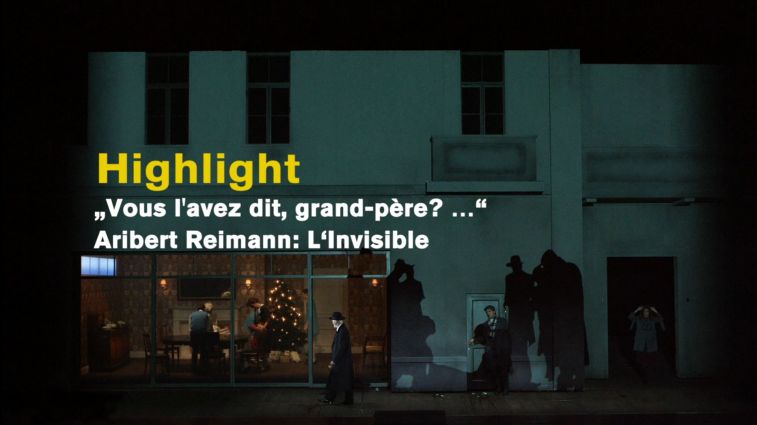Zwölf Fragen an Aribert Reimann - Deutsche Oper Berlin
Questions to Aribert Reimann
Aribert Reimann has had professional links to the Deutsche Oper Berlin since his engagement as répétiteur at the opera house shortly after leaving school. We congratulate the renowned German composer as he celebrates his 85th birthday.
Mr Reimann, you’re 85 years old – and Covid has just turned 1. How are you?
It’s such a pity that I can’t be celebrating my birthday in the Deutsche Oper Berlin, as we’d planned. The revival of L’INVISIBLE had been set for that day, of course. But what can you do? Things are being cancelled left, right and centre, so I fully understand the decision.
You’re in an at-risk category. What was 2020 like for you?
Obviously I’m hardly seeing anyone at the moment, only a few close friends. I only leave the house to shop for groceries or to attend unavoidable meetings. Six premieres of productions of my works had to be called off, plus a few concerts of my pieces. All cancelled. I’ve never had so many cancellations.
How do you get on composing during the pandemic?
It doesn’t affect my work at all. Composers work in seclusion as a matter of course. And when you’re busy on a major project, like I am at the moment, you’re doubly cut off from the world. I spend all my time in my studio and I have thoughts only for the work at hand. It’s always been that way for me at the intense stages of opera composition.
What kind of thoughts dominate your waking hours at the moment?
My thoughts turn every day to all the singers and musicians who are prevented from performing. For the artists it’s an absolute disaster.
What have you learnt from these 12 months of Covid?
I’m guessing the crisis will lead to a shift in thinking regarding our abuse of the natural world, because these things are connected. I’ve been reflecting a lot on how our life, as we knew it, was never something to be taken for granted. You know, I was acutely aware of the world war going on around me – and that sensibility continued into the post-war years.
How does this experience of war help you in today’s world?
I’m deeply conscious of the fact that nothing will last forever. A war can break out tomorrow. There are no guarantees. I was used to going without as a child, so it’s easier for me to deal with restrictions now than it is for the younger generation. After the war we spent four months on the road as refugees, pushing our belongings in a cart, like Mother Courage. I was nine. The only thing we had to survive on was a box of Knorr stock cubes.

L’INVISIBLE, which was scheduled to be performed at the Deutsche Oper Berlin on 4th March, your 85th birthday, is dedicated to your brother, who died in an air raid. How does the work confront you with your own pain?
The three short plays by Maurice Maeterlinck, which my work is based on, had been preoccupying me for years. The third part of the trilogy especially, La Mort de Tintagiles, is very much entwined in my mind’s eye with my brother: Tintagiles, the boy, is abducted by an invisible queen. I knew I had to write something for my brother, but it took me seventy years to put pen to paper. It was 6th March 1944 - I was eight years old – when death was unleashed over me in person. My brother was killed in the bombing raid on Templin. I hardly reacted when I was told what had happened. I was struck dumb. My brother was a huge part of my life, as we’d often been evacuated to avoid the bombing raids. He was five years older than me and he looked after me. I very much clung to him - and he to me in his way. When I’d finished the composition, there was this huge feeling of redemption.
What can we learn from L’INVISIBLE at this present time?
Naturally this work can help people realise in the present day, too, that death is omnipresent. Death has been my constant companion since that day in March 1944. I’ve never been under any illusion: everyone’s number is up sooner or later.
L’INVISIBLE is also about the helpless way in which people face death. What can we learn about mourning from your music?
You can’t obsess about mourning. The grieving process is a shifting, changing thing – even though it sometimes lasts a long time. For ages something was telling me that I’d have to write an anti-war opera sooner or later. In April 1945, three weeks before the capitulation, I witnessed the destruction of Potsdam in a single night. That night was awful. An apocalypse. Forty years later I wrote my anti-war opera, TROADES, based on the play by Euripides. Around the time that I was completing that opera I found myself dreaming about my mother every night. I took it to mean that I should dedicate the opera to her. No sooner had I done that than she vanished from my dreams. I felt like a weight had been lifted off my chest. It’s very moving, the way everything is connected: my work as a composer, the thoughts, the mourning, the things I’ve witnessed. You can’t separate those things; we’re not automatons. That said, my art will never just be about personal stuff. I can’t set material to music if it doesn’t have some measure of social relevance.

“Hope forms a part of every one of my works,” you once said. What hope do you have right now?
My hope is that we’ll defeat this virus together. Just as we hoped that the war would at last be over. It really is a miracle that they’ve come up with vaccines in such a short period of time! And I’m so grateful that I’ve just received the call to come for my jab.
The pandemic has put paid to partying. How will you be celebrating?
It’ll be a small affair with a few people who I’m very close to. Nothing more is allowed.
Your greatest wish for your birthday?
That I get to complete the project I’m working on – I think it’ll keep me busy for another two years. And after that there’s another commission waiting! I just hope I stay healthy enough to finish all my work.




